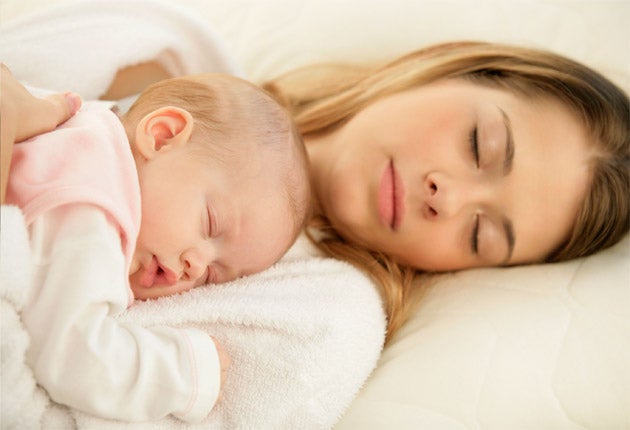Cot death linked to shared beds
Researchers warn against falling asleep with the baby in bed or on a sofa

Your support helps us to tell the story
From reproductive rights to climate change to Big Tech, The Independent is on the ground when the story is developing. Whether it's investigating the financials of Elon Musk's pro-Trump PAC or producing our latest documentary, 'The A Word', which shines a light on the American women fighting for reproductive rights, we know how important it is to parse out the facts from the messaging.
At such a critical moment in US history, we need reporters on the ground. Your donation allows us to keep sending journalists to speak to both sides of the story.
The Independent is trusted by Americans across the entire political spectrum. And unlike many other quality news outlets, we choose not to lock Americans out of our reporting and analysis with paywalls. We believe quality journalism should be available to everyone, paid for by those who can afford it.
Your support makes all the difference.More than half of cot deaths happen when a baby is sleeping with a parent, a study reveals today.
Researchers said this could be linked to the baby's parent having been drinking or taking drugs, before falling asleep with the baby in bed or on a sofa. Despite a dramatic drop in the rate of cot deaths in the UK since the early 1990s, experts are advising parents to avoid sleeping with their babies in order to help reduce these deaths even further.
A team of researchers at Bristol and Warwick universities studied all unexpected deaths of infants – aged from birth to two years old – in the South-west of England from January 2003 to December 2006.
Of the 80 cot deaths analysed, more than half (54 per cent) occurred while the parent and baby were sleeping together. Nearly a third of the deaths occurred among parents who drank alcohol or used drugs before falling asleep with their babies, which may explain much of the risk, the researchers say, as it may mean that a parent is less likely to wake up.
Sleeping with a baby on a sofa rather than in bed also increased the risk. A fifth of cot death infants were found with a pillow and a quarter were swaddled, suggesting potentially new risk factors emerging.
The researchers said some of the safety messages were getting across to parents and may have contributed to the continued fall in the cot death rate. However, parents were not heeding warnings about putting their babies to sleep in a hazardous environment. The safest place for an infant to sleep is in a cot beside the parental bed in the first six months of life, said the study published online in the British Medical Journal.
The term sudden infant death syndrome (Sids) was introduced in 1969 as a recognised category of natural death that carried no implication of blame for bereaved parents. Since then, a lot has been learnt about risk factors, and parents are now advised to reduce the risk of death by placing infants on their back to sleep, placing infants in the "feet to foot" position, where their feet touch the end of the cot, and keeping infants in a smoke-free environment.
But it is not clear which risk messages have been taken on board in different social or cultural groups, and little is known about the emergence of new or previously unrecognised risk factors.
Lead author Peter Fleming, professor of infant health and development physiology at Bristol University, said: "We have been able to look at the conditions that make sharing a bed or sofa with a parent hazardous. People understand the implications of drinking and driving and the vast majority follow that advice. So we want parents – if they've had a drink or taken drugs – not to co-sleep with their baby."
Professor Fleming said many parents got up in the middle of the night to feed their baby on a sofa or armchair – believing it was safer than feeding them in bed, but the opposite was true.
"It is really important that parents should not fall asleep with their baby on a sofa as it is very, very dangerous," he said. "It is 25 times more risky than having a baby in bed with you. After parents have fed a baby it is really important they put them back in their cot."
Join our commenting forum
Join thought-provoking conversations, follow other Independent readers and see their replies
Comments